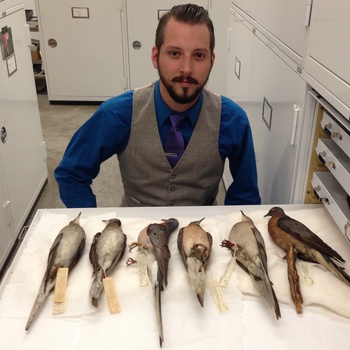Growing Up Ape: The Long-term Science of Studying Our Closest Living Relatives
Elizabeth Lonsdorf
April 30, 02019
Studying primates offers insight into human evolution and behavior. Primatologist Elizabeth Lonsdorf shares her ongoing work with wild chimpanzees and gorillas: a unique long-term project that extends the seminal research by Jane Goodall and colleagues into the 21st century. Modern humans wean years earlier than African apes, a fact that is associated with several unique behaviors of being human (involving fertility, brain development, and life span). But our understanding of weaning in apes is actually quite limited. Dr Lonsdorf uses new technology and tools to better understand chimpanzee and gorilla development, and in the process learn more about us.
Elizabeth V. Lonsdorf is an Associate Professor of Psychology and the Biological Foundations of Behavior Program at Franklin & Marshall College. She began studying primates as an undergraduate at Duke University where she conducted research on percussive foraging in the endangered aye-aye. She completed her Ph.D. at the Jane Goodall Institute's Center for Primate Studies at the University of Minnesota, and was founding director of the Lester E. Fisher Center for the Study and Conservation of Apes at the Lincoln Park Zoo in Chicago.
She directs Franklin & Marshall’s primate research laboratory, is a National Geographic Emerging Explorer, and serves on the board of directors for Chimp Haven and the National Chimpanzee Sanctuary. She returns annually to Gombe to maintain a research program focused on chimpanzee health and infant development in collaboration with the Jane Goodall Institute and other collaborators. She is a 02018-19 fellow at the Center for Advanced Study in the Behavioral Sciences (CASBS) at Stanford University.
Upcoming Talks
Videos

Johanna Hoffman
Speculative Futures: Design Approaches to Foster Resilience and Co-create the Cities We Need
October 12, 02022

Creon Levit
Space Debris and The Kessler Syndrome: A Possible Future Trapped on Earth
April 26, 02022

Brittany Cox
Horological Heritage: Generating bird song, magic, and music through mechanism
August 20, 02019

Elizabeth Lonsdorf
Growing Up Ape: The Long-term Science of Studying Our Closest Living Relatives
April 30, 02019

James Holland Jones
The Science of Climate Fiction: Can Stories Lead to Social Action?
January 29, 02019

Kevin Kelly, Stewart Brand, Alexander Rose
Siberia: A Journey to the Mammoth Steppe
January 22, 02019

Caroline Winterer
The Art and Science of Deep Time:
Conceiving the Inconceivable in the 19th Century
September 4, 02018

Esther Dyson
The Short Now: What Addiction, Day Trading, and Most of Society’s Ills Have in Common
July 17, 02018

Hannu Rajaniemi
The Spirit Singularity: Science and the Afterlife at the Turn of the 20th Century
July 10, 02018

Shahzeen Attari
Facts, Feelings and Stories: How to Motivate Action on Climate Change
June 26, 02018

Renée DiResta
Disinformation Technology: How Online Propaganda Campaigns Are Influencing Us
April 10, 02018

Scott Kildall
Art Thinking + Technology: A Personal Journey of Expanding Space and Time
August 15, 02017

Miles Traer
The Geological Reveal: How the Rock Record Shows Our Relationship to the Natural World
June 27, 02017

Andrew Lakoff
How We Became “Unprepared”:
Imagining Catastrophe from the Cold War to Bird Flu
May 30, 02017

Jennifer Petersen
Why Freedom of Speech Is More Than Speech:
Expressions in Media and Code
April 18, 02017

Tara Behrend
The Psychology of Surveillance:
How Being Watched Changes Our Behavior
February 28, 02017

Ben Novak
The Next Flight of the Passenger Pigeon: Engineering Nature's Engineers
September 27, 02016









































































